#overlap: raisins
Explore tagged Tumblr posts
Text
"I like hot raisins."
December 5, 2013: When The 1975 are asked about their favorite snacks, Ross mentions Matty's preference for hot raisins. (source)
#year: 2013#december 2013#quote: matty healy#topic: snacks#topic: hot raisins#overlap: raisins#era: self-titled#tumblr era#dressed in black#get to know them#source: ask anything
2 notes
·
View notes
Text
still lowkey shook that this url was available but i’m also grateful for the fact that the wilo fans on here amass to abt 4 ppl so i never had anything to worry abt in the first place 👍🏽👍🏽
#if we did a venn diagram of mark fans & william fans the former’s circle would be the size of jupiter#and then wilo’s one would be a teeny weeny shrivelled raisin of a round thing#and then the overlap would be even smaller bc im the only one in it#piku.txt#𓏲 ࣪₊♡𓂃 queue
3 notes
·
View notes
Text
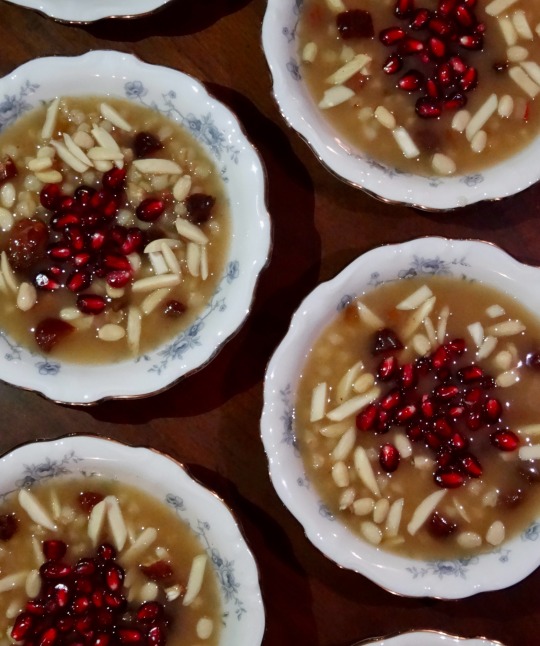
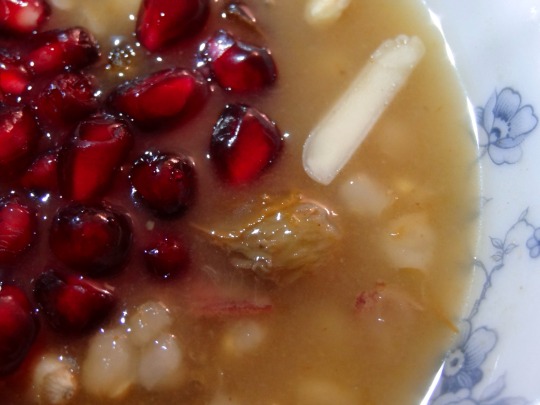
[ID: First image shows four small porcelain bowls of a pudding topped with slivered almonds and pomegranates seeds, seen from above. Second image is an extreme close-up showing the blue floral pattern on the china, slivered almonds, golden raisins, and pomegranate seeds on top of part of the pudding. End ID]
անուշապուր / Anush apur (Armenian wheat dessert)
Anush apur is a sweet boiled wheat pudding, enriched with nuts and dried fruits, that is eaten by Armenians to celebrate special occasions. One legend associates the dish with Noah's Ark: standing on Mt. Ararat (Արարատ լեռը) and seeing the rainbow of God's covenant with humanity, Noah wished to celebrate, and called for a stew to be prepared; because the Ark's stores were diminishing, the stew had to be made with small amounts of many different ingredients.
The consumption of boiled grains is of ancient origin throughout the Levant and elsewhere in West Asia, and so variations of this dish are widespread. The Armenian term is from "անուշ" ("anush") "sweet" + "ապուր" ("apur") "soup," but closely related dishes (or, arguably, versions of the same dish) have many different, overlapping names.
In Arabic, an enriched wheat pudding may be known as "سْنَينِيّة" ("snaynīyya"), presumably from "سِنّ" "sinn" "tooth" and related to the tradition of serving it on the occasion of an infant's teething; "قَمْح مَسْلُوق" ("qamḥ masluq"), "boiled wheat"; or "سَلِيقَة" ("salīqa") or "سَلِيقَة القَمْح" ("salīqa al-qamḥ"), "stew" or "wheat stew," from "سَلَقَ" "salaqa" "to boil." Though these dishes are often related to celebrations and happy occasions, in some places they retain an ancient association with death and funerary rites: qamh masluq is often served at funerals in the Christian town of بَيْت جَالَا ("bayt jālā," Beit Jala, near Bethlehem).
A Lebanese iteration, often made with milk rather than water, is known as "قَمْحِيَّة" ("qamḥīyya," from "qamḥ" "wheat" + "ـِيَّة" "iyya," noun suffix).
A similar dish is known as "بُرْبَارَة" ("burbāra") by Palestinian and Jordanian Christians when eaten to celebrate the feast of Saint Barbara, which falls on the 4th of December (compare Greek "βαρβάρα" "varvára"). It may be garnished with sugar-coated chickpeas and small, brightly colored fennel candies in addition to the expected dried fruits and nuts.
In Turkish it is "aşure," from the Arabic "عَاشُوْرَاء" ("'āshūrā"), itself from "عَاشِر" ("'āshir") "tenth"—because it is often served on the tenth day of the month of ٱلْمُحَرَّم ("muḥarram"), to commemorate Gabriel's teaching Adam and Eve how to farm wheat; Noah's disembarkment from the Ark; Moses' parting of the Red Sea; and the killing of the prophet ال��حُسَيْن بْنِ عَلِي (Husayn ibn 'Ali), all of which took place on this day in the Islamic calendar. Here it also includes various types of beans and chickpeas. There is also "diş buğdayı," "tooth wheat" (compare "snayniyya").
These dishes, as well as slight variations in add-ins, have varying consistencies. At one extreme, koliva (Greek: "κόλλυβα"; Serbian: "Кољиво"; Bulgarian: "Кутя"; Romanian: "colivă"; Georgian: "კოლიო") is made from wheat that has been boiled and then strained to remove the boiling water; at the other, Armenian anush apur is usually made thin, and cools to a jelly-like consistency.
Anush apur is eaten to celebrate occasions including New Year's Eve, Easter, and Christmas. In Palestine, Christmas is celebrated by members of the Armenian Apostolic church from the evening of December 24th to the day of December 25th by the old Julian calendar (January 6th–7th, according to the new Gregorian calendar); Armenian Catholics celebrate on December 24th and 25th by the Gregorian calendar. Families will make large batches of anush apur and exchange bowls with their neighbors and friends.
The history of Armenians in Palestine is deeply interwoven with the history of Palestinian Christianity. Armenian Christian pilgrimages to holy sites in Palestine date back to the 4th century A.D., and permanent Armenian monastic communities have existed in Jerusalem since the 6th century. This enduring presence, bolstered by subsequent waves of immigration which have increased and changed the character of the Armenian population in Palestine in the intervening centuries, has produced a rich history of mutual influence between Armenian and Palestinian food cultures.
In the centuries following the establishment of the monasteries, communities of Armenian laypeople arose and grew, centered around Jerusalem's Վանք Հայոց Սրբոց Յակոբեանց ("vank hayots surbots yakobeants"; Monastery of St. James) (Arabic: دَيْر مَار يَعْقُوب "dayr mār ya'qūb"). Some of these laypeople were descended from the earlier pilgrims. By the end of the 11th century, what is now called the Armenian Quarter—an area covering about a sixth of the Old City of Jerusalem, to the southwest—had largely attained its present boundaries.
Throughout the 16th and 17th centuries, the Patriarchate in Jerusalem came to have direct administrative authority over Armenian Christians across Palestine, Lebanon, Egypt, and Cyprus, and was an important figure in Christian leadership and management of holy sites in Jerusalem (alongside the Greek Orthodox and Roman Catholic churches). By the middle of the 19th century, a small population of Armenian Catholics had joined the larger Armenian Apostolic community as permanent residents in Jerusalem, living throughout the Muslim Quarter (but mostly in a concentrated enclave in the southwest); in the beginning of the 20th century, there were between 2,000 and 3,000 Armenians of both churches in Palestine, a plurality of whom (1,200) lived in Jerusalem.
The Turkish genocide of Armenians beginning in 1915 caused significant increases in the populations of Armenian enclaves in Palestine. The Armenian population in Jerusalem grew from 1,500 to 5,000 between the years of 1918 and 1922; over the next 3 years, the total number of Armenians in Palestine (according to Patriarchate data) would grow to 15,000. More than 800 children were taken into Armenian orphanages in Jerusalem; students from the destroyed Չարխափան Սուրբ Աստվածածին վանք (Charkhapan Surb Astvatsatsin Monastery) and theological seminary in Armash, Armenia were brought to the Jerusalem Seminary. The population of Armenian Catholics in the Muslim Quarter also increased during the first half of the 20th century as immigrants from Cilicia and elsewhere arrived.
The immediate importance of feeding and housing the refugees despite a new lack of donations from Armenian pilgrims, who had stopped coming during WW1—as well as the fact that the established Armenian-Palestinians were now outnumbered by recent immigrants who largely did not share their reformist views—disrupted efforts on the part of lay communities and some priests to give Armenian laypeople a say in church governance.
The British Mandate, under which Britain assumed political and military control of Palestine from 1923–1948, would further decrease the Armenian lay community's voice in Jerusalem (removing, for example, their say in elections of new church Patriarchs). The British knew that the indigenous population would be easier to control if they were politically and socially divided into their separate religious groups and subjected to the authority of their various religious hierarchies, rather than having direct political representation in government; they also took advantage of the fact that the ecclesiastical orders of several Palestinian Christian sects (including the Armenian Patriarchate of Jerusalem) comprised people from outside of Palestine, who identified with religious hierarchy and the British authorities more than they identified with the Palestinian lay communities.
British policy, as well as alienating Armenians from politics affecting their communities, isolated them from Arab Palestinians. Though the previously extant Armenian community (called "քաղաքացի" "kaghakatsi," "city-dwellers") were thoroughly integrated with the Arab Palestinians in the 1920s, speaking Arabic and Arabic-accented Armenian and eating Palestinian foods, the newer arrivals (called "زُوَّار" / "զուվվար" "zuwwar," "visitors") were unfamiliar with Palestinian cuisine and customs, and spoke only Armenian and/or Turkish. Thus British policies, which differentiated people based on status as "Arab" (Muslim and Christian) versus "Jewish," left new Armenian immigrants, who did not identify as Arab, disconnected from the issues that concerned most Palestinians. They were predominantly interested in preserving Armenian culture, and more concerned with the politics of the Armenian diaspora than with local ones.
Despite these challenges, the Armenian Patriarchate of Jerusalem came to be a vital center of religious and secular culture for the Armenian diaspora during the British Mandate years. In 1929, Patriarch Yeghishe Turian reëstablished the Սուրբ Յակոբեանց Տպարան ("surbots yakobeants taparan"; St. James printing house); the Patriarchate housed important archives relating to the history of the Armenian people; pilgrimages of Armenians from Syria, Lebanon, and Egypt increased and the economy improved, attracting Armenian immigrants in higher numbers; Armenians held secular roles in governance, policing, and business, and founded social, religious, and educational organizations and institutions; Armenians in the Old and New Cities of Jerusalem were able to send financial aid to Armenian victims of a 1933 earthquake in Beirut, and to Armenians expelled in 1939 when Turkey annexed Alexandretta.
The situation would decline rapidly after the 1947 UN partition resolution gave Zionists tacit permission to expel Palestinians from broad swathes of Palestine. Jerusalem, intended by the plan to be a "corpus separatum" under international administration, was in fact subjected to a months-long war that ended with its being divided into western (Israeli) and eastern (Palestinian) sections. The Armenian population of Palestine began to decline; already, 1947 saw 1,500 Armenians resettled in Soviet Armenia. The Armenian populations in Yafa and Haifa would fall yet more significantly.
Still, the Armenian Patriarchate of Jerusalem maintained its role as the center of Armenian life in Palestine; the compound provided food and shelter to thousands of Armenians during the Battle for Jerusalem and the Nakba (which began in 1948). Some Armenians formed a militia to defend the Armenian Quarter against Haganah shelling during the battle.
In the following years, historical British contributions to the shoring up of insular power in the Patriarchate would cause new problems. The Armenian secular community, no longer empowered to oversee the internal workings of the Patriarchate, could do nothing to prevent embezzling, corruption, and even the sale of church-owned land and buildings to settlers.
In 1967, Israeli military forces annexed East Jerusalem, causing another, albeit smaller, surge in Armenian emigration from the city. Daphne Tsimhoni estimates based on various censuses that the Armenian population of Jerusalem, which had reached 5,000-7,000 at its peak in 1945–6, had fallen back to 1,200 by 1978.
Today, as in the 20th century, Armenians in Jerusalem (who made up nearly 90% of the Armenian population of Palestine as of 1972) are known for the insularity of their community, and for their skill at various crafts. Armenian food culture has been kept alive and well-defined by successive waves of immigrants. As of 2017, the Armenian Patriarchate supplied about 120 people a day with Armenian dishes, including Ղափամա / غاباما "ghapama" (pumpkin stuffed with rice and dried fruits), թոփիկ / توبيك "topig" (chickpea-and-potato dough stuffed with an onion, nut, fruit, and herb filling, often eaten during Lent), and Իչ / ايتش "eetch" (bulgur salad with tomatoes and herbs).
Restaurants lining the streets of the Armenian and Christian quarters serve a mixture of Armenian and Palestinian food. Լահմաջո "lahmadjoun" (meat-topped flatbread), and հարիսա / هريس "harisa" (stew with wheat and lamb) are served alongside ֆալաֆել / فلافل ("falafel") and մուսախան / مسخن ("musakhkhan"). One such restaurant, Taboon Wine Bar, was the site of a settler attack on Armenian diners in January 2023.
Up until 2023, despite fluctuations in population, the Armenian community in Jerusalem had been relatively stable when compared to other Armenian communities and to other quarters of the Old City; the Armenian Quarter had not been subjected to the development projects to which other quarters had been subjected. However, a deal which the Armenian Patriarchate had secretly and unilaterally made with Israel real estate developer Danny Rotham in 2021 to lease land and buildings (including family homes) in the Quarter led Jordan and Palestine to suspend their recognition of the Patriarch in May of 2023.
On 26th October, the Patriarchate announced that it was cancelling the leasing deal. Later the same day, Israeli bulldozers tore up pavement and part of a wall in حديقة البقر ("ḥadīqa al-baqar"; Cows' Garden; Armenian: "Կովերի այգու"), the planned site of a new luxury hotel. On 5th November, Rothman and other representatives of Xana Gardens arrived with 15 settlers—some of them with guns and attack dogs—and told local Armenians to leave. About 200 Armenian Palestinians arrived and forced the settlers to stand down.
On 12th and 13th November, the developer again arrived with bulldozers and attempted to continue demolition. In response, Armenian Palestinians have executed constant sit-ins, faced off against bulldozers, and set up barricades to prevent further destruction. The Israeli occupation police backed settlers on another incursion on 15th November, ordering Armenian residents to vacate the land and arresting three.
On December 28th, a group of Armenian bishops, priests, deacons, and seminary students (including Bishop Koryoun Baghdasaryan, the director of the Patriarchate's real estate department) were attacked by a group of more than 30 people armed with sticks and tear gas. The Patriarchate attributed this attack to Israeli real estate interests trying to intimidate the Patriarchate into abandoning their attempt to reverse the lease through the court system. Meanwhile, anti-Armenian hate crimes (including spitting on priests) had noticeably increased for the year of 2023.
These events in Palestine come immediately after the ethnic cleansing of Լեռնային Ղարաբաղ ("Lernayin Gharabagh"; Nagorno-Karabakh); Israel supplied exploding drones, long-range missiles, and rocket launchers to help Azerbaijan force nearly 120,000 Armenians out of the historically Armenian territory in September of 2023 (Azerbaijan receives about 70% of its weapons from Israel, and supplies about 40% of Israel's oil).
Support Palestinian resistance by donating to Palestine Action’s bail fund; buying an e-sim for distribution in Gaza; or donating to help a family leave Gaza.
Ingredients
180g (1 cup) pearled wheat (قمح مقشور / խոշոր ձաւար), soaked overnight
3 cups water
180-360g (a scant cup - 1 3/4 cup) sugar, or to taste
Honey or agave nectar (optional)
1 cup total diced dried apricots, prunes, golden raisins, dried figs
1 cup total chopped walnuts, almonds, pistachios
1 tsp rosewater (optional)
Ceylon cinnamon (դարչին) or cassia cinnamon (կասիա)
Aniseed (անիսոն) (optional)
Large pinch of salt
Pomegranate seeds, to top (optional)
A Palestinian version of this dish may add pine nuts and ground fennel.
Pearled wheat is whole wheat berry that has gone through a "pearling" process to remove the bran. It can be found sold as "pearled wheat" or "haleem wheat" in a halal grocery store, or a store specializing in South Asian produce.
Amounts of sugar called for in Armenian recipes range from none (honey is stirred into the dish after cooking) to twice the amount of wheat by weight. If you want to add less sugar than is called for here, cook down to a thicker consistency than called for (as the sugar will not be able to thicken the pudding as much).
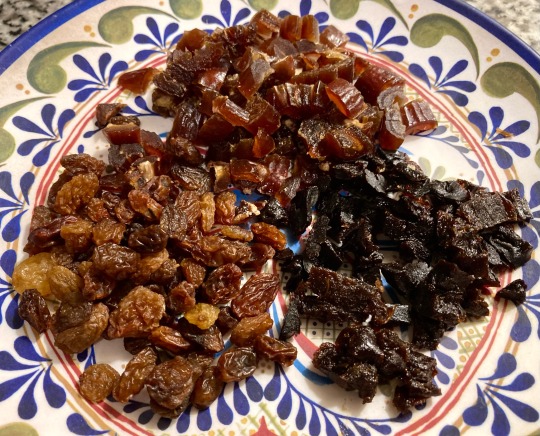
Instructions
1. Submerge wheat in water and scrub between your hands to clean and remove excess starch. Drain and cover by a couple inches with hot water. Cover and leave overnight.
2. Drain wheat and add to a large pot. Add water to cover and simmer for about 30 minutes until softened, stirring and adding more hot water as necessary.
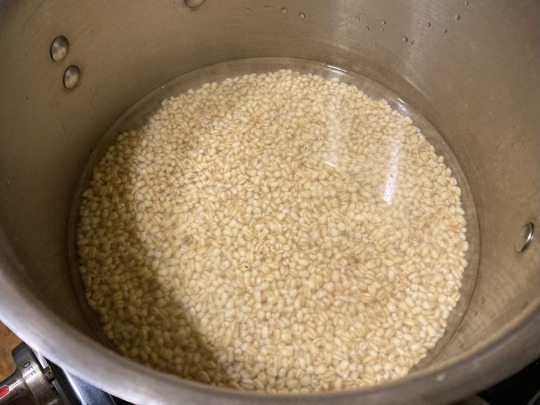
Wheat before cooking
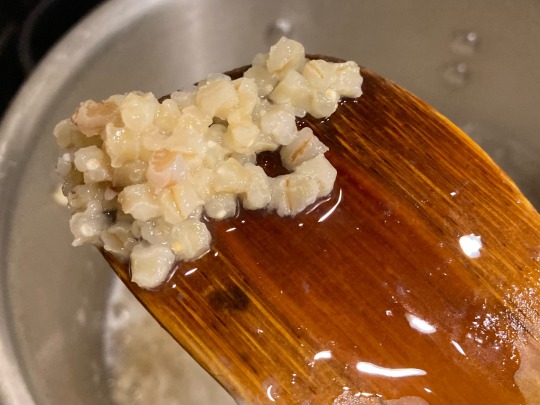
Wheat after cooking
3. Add dried fruit, sugar, salt, and spices and simmer for another 30 minutes, stirring occasionally, until wheat is very tender. Add water as necessary; the pudding should be relatively thin, but still able to coat the back of a spoon.
4. Remove from heat and stir in rosewater and honey. Ladle pudding into individual serving bowls and let cool in the refrigerator. Serve cold decorated with nuts and pomegranate seeds.
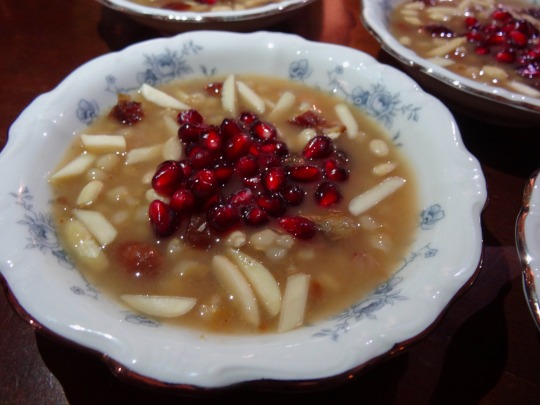
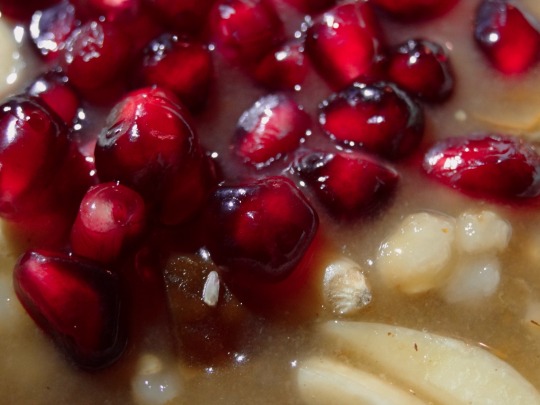
#the last link is a different / new fundraiser#Armenian#Palestinian#fusion#wheat berries#pearled wheats#pomegranate#prunes#dried apricot#dates#long post /
379 notes
·
View notes
Note
Omg i love your fics sm it’s actually insane!!!
Maybe booklover!reader x Embry where she just LOVES to talk about the books she’s read to Embry??
Aww thanks so much!! Sorry but the holidays zapped my energy! Send some more request pls 💙💙
My love language- Embry x reader
You were not a nerd per se, but loved reading books likely more than those who wrote them. Preferring the classics, you never missed a yard sale or antique show in town hoping to find collector editions. Books A Million rocked, and even the local bookstore were wonderful for gently used or new books. They had those cute sets in a box, but nothing compared to finding an old or original copy of your favorites. However, this was hard to do so any used copy was pretty cool. You even loved books with notes written in the margins so you could compare someone else’s thoughts with yours.
Your next read was on the library top shelf where of course you couldn’t reach it. Considering if it was even worth it at this point, a tall handsome guy came to your rescue. Embry, your boyfriend, was quick to make sure you didn’t try climbing on the shelves again. After the story of how you did that a couple of years ago, fell down with books falling on your wrist, and finally ending up needing a couple of surgeries to correct the damage, Embry would watch you like a hawk. Sometimes you were faster, or more like he was looking at the comic book section with Quil.
“Hey, babe seriously i promise i will get anything you ever need ok? No more climbing.” You looked up at him blinking your eyelashes at him like you were clueless to anything he was insinuating.
“I didn’t want to bother you. You finally looked relaxed.” The pack has chased a few rogue vampires off tribal lands the past week, leaving most of the wolves to be exhausted with little sleep. Even though you begged him to stay home and sleep, he claimed he was fine after three days not seeing anymore vampires. You knew not to hold your breath, but having your imprint and boyfriend with you on a day date together sounded wonderful.
“Please, don’t worry about me okay? I want you to leave telling me about the books we are borrowing, and not screaming in pain this time okay?” He looked down at you with such intensity and care that now you felt bad. “Stop feeling bad, just pinky promise?” He held out his pinky as he could see your brain and mood instantly processing the change of thinking you are helping to realizing you were making his life harder. Grasping his pinky with a returned promise and kiss, you then turned to see the librarian to check out your books.
Embry holds open the car door as you climb in barely able to hold in your thoughts. As he starts the car, you finally gush about which books you got and why. You would’ve started in the library but you love his undivided attention in the car without having to stop gushing about your books to chat with the librarian or even get in the car. You just wanted him to let you literally spew it all out. He loves every second of it.
You decided to get several classics that you actually haven’t found in a copy you would want on your shelf. Being picky often came with the price of acquiring patience to wait for the perfect item for the collection, or giving up. Quitting was not in your vocabulary, so waiting your turn for the next novel at the public library was necessary.
Embry listened as you told him about the books you held in your lap: Moby Dick, The Old Man and the Sea, and 20,000 Leagues Under the Sea. You added in some fantasy books as well like Harry Potter since you actually just started reading the series. You explained the characters of Jane Austen and how they overlapped with Emily Brontë or even plays from the 20th century such as A Raisin in the Sun.
As you stopped spilling all your thoughts like an artist paints a canvass after finding his greatest muse, Embry smiles and asks questions upon questions just to see your eyes light up and your face shining with excitement detailing all the romance, adventure, or even down right annoying things you screamed at the author for writing in plot. Needless to say you were passionate about literature of all types.
Never ceasing to amaze and surprise you, Embry drops a question that made you fall in love with him again!
“Shall we head to the thrift store today? I also found a garage sale out 2 hours away, but it seems as though they are holding an antique set of the Little House on the Prairie novels that you read as a kid just for you. That is if you can stand to be with your handsome boyfriend and soulmate all day?”
Not knowing how you could say no to that, or why any girl would ever want to say no, you shake the car with your excitement! Embry was driving already in the direction for your date, but you couldn’t hold it in. Then the guilt set in.
“Em you haven’t been sleeping much. Let’s wait and go take a nap and relax at home.” You wanted to go to the sale and Embry knew it, but he also knew Sam let him off for the next day too so he could spend tomorrow relaxing unless another leech came on the territory. “Absolutely not! Y/N I want to spend the day with you ok? Besides I have a free pass tomorrow without patrol courtesy of my alpha, so we have to be super nice to him for like a week.” He flashes you a smile that tells you all you needed to know. They planned this date and you decided you were going to enjoy it.
As you finally arrived home at midnight with the longer drive, you were the proud new owner of multiple antique collections that the owner basically gave away. After seeing you two, the owner said he would be willing to sell them for a small amount because Y/N would appreciate them instead of selling them for a major profit online somewhere.
Kissing your man and thanking him for the special day, you are so excited to wake up in the morning with a cup of coffee and one of your newest editions to your collection.
66 notes
·
View notes
Text
I was tagged by @deedala (shoutout to the old BSN) for birthday themed questions <3
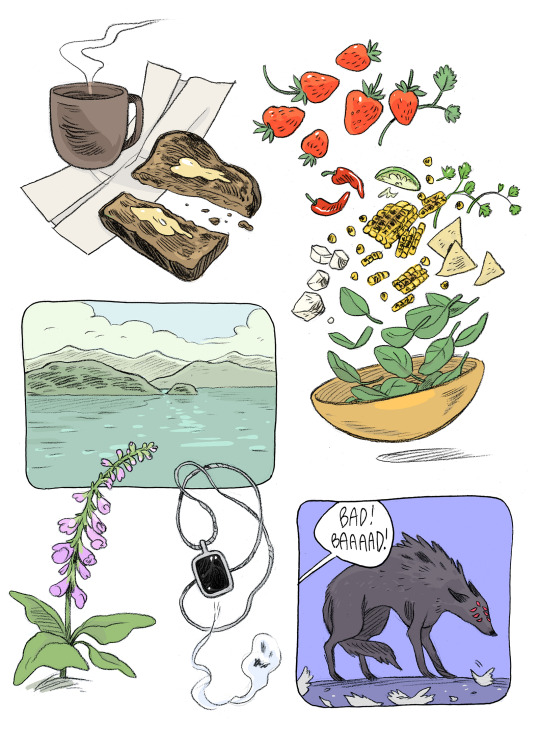
And since there's some overlapping relevance, here's my birthday want list from a few months ago, which just happens to contain a little bit of DA fanart (all my dragon age wishes were indeed granted, thank you very kindly).
When is yours? June 15th
Where were you born? Vancouver, Canada
How do you feel about your legal name? Are you using it online and/or IRL? I’m fine with my name – and I definitely use it online. I don't think it's ideal, but I’ve never come up with a handle that I like enough to stick with.
How about your sign? Do you feel it "fits"? No, although my main associations come from people in high school reading me my horoscope out of Seventeen magazine, and it being something along the lines of, “girl, you’ve got the gift of the gab! You’re the life of every party!” Thank you, Seventeen, but wrong on all counts.
What's your earliest memory related to your birthday? My parents hosted a birthday party for me when I was maybe four or five years old, and as soon as the cake emerged and everyone started singing “Happy Birthday”, I buried my head under my arms and refused to come out. And when you think about it, having a bunch of people all staring at you and smiling and singing your name in unison IS, actually, very strange and uncomfortable...
What's one of the best gifts you've ever received? Every shiny that anyone has ever sent or given to me!
How about one of the best you've given yourself? I think that an excellent gift blueprint involves choosing a book that you like (and which you think the receiver might also like), and then collecting a few treats that might pair well with it and turning it all into a small care package. Example selection: your favourite fantasy book plus a box/batch of cookies plus a package of nice tea or coffee plus a stubby beeswax candle plus a random treasure object (nice stone or little animal figurine or dried flower, etc.) And in case I misinterpreted the question, I think it also works well as a gift to yourself. (I made a Patreon post that expanded on this a while back, so I'll link it here, too.)
What's your favourite cake flavour? Dark fruit cake! 2kg of raisins drowned and left to rot in sin.
How about your favourite flowers? All the common weedy wildflowers in my area, like yarrow and foxgloves. I also I stop to smell every rose I see. Personal best practice.
Have your ever thrown a birthday party? If yes, tell us about your favourite one. No, and I pity anyone whose birthday pleasures rely on my party-throwing skills.
What's the ultimate birthday song? I’ll say “Come Undone” by Duran Duran, because “happy birthday to you” is in the opening few lines (and also because I love this song). Beyond that, I’m drawing a blank.
And last but not least, pick a celebrity with whom you share your birthday. Ice Cube!
I'm scared to tag anybody I don't know well, so with zero pressure: @klovharun and @unstablemable, who can at least tell me no in person.
36 notes
·
View notes
Note
For the headcanons, how about Edgar?
Oh boy! One of my favorite characters! ... To write and HC about. I'm not very good with close-ranged brawlers.
Edgar HCs
Quick thing before I get into the bulk of things. I will not be putting any ship headcanons here. I have plenty of HCs without counting them so I'd probably make another post for it instead.
Edgar has always been involved in the park in some way. He's got family in the higher ups with his mother being the CEO of the whole thing. He was fairly confident that at some point HE would become the CEO of Starr Park and of Brawl Stars
He often gets into fights with his mother about his lifestyle choices and attitude (aka. being emo). At some point, these fights somehow ended up with Edgar being both a brawler and a gift shop employee. Probably to try and get him to change.
Edgar was ecstatic to be a brawler cause he thinks the fights are really cool, but he hates the fact that he had to work in the shop as well to keep that position.
Edgar unfortunately plays the straight man to both Colette and Griff's shenanigans.
Actually he ends up playing the straight man to a lot of things because he just keeps geting wrapped up in other brawler projects.
He complains about it but thats just because hes a drama queen. He does enjoy himself a lot, though he wont admit it to keep up with his persona.
He unfortunately knows a lot about the Brawl Stars fandom culture because Colette just wouldn't shut up about it.
Edgar ends up being the fall guy for Griff when he disappears to escape his poor financial choices. Alas, he doesn't have the power to get his boss fired.
He's the Number 1 Bad Randoms Fan. He personally fought Colette for that title. He knows all their songs by heart and even made their band shirt part of his normal wear.
He has actually played for them a few times, mostly as a back up drummer when Stu is unavailable. He loves it when it happens. He thinks this is what Colette must feel like all the time.
Edgar can play the Drums and Bass, though he prefers drums.
He bonds a lot with Poco because of the slight overlap in the Bad randoms and their music. This is why he also gets along well with Draco.
He and Fang have a mutual and healthy rivalry. Though sometimes they both think the other is a little stupid.
He admires El Primo but would rather die than admit that out loud.
Has complicated feelings for Belle and Byron as some weird Auntie and Uncle situations. (Might Elaborate in another thing)
Actually a big comic book fan, though hes not as loud and proud of it as he is with the Bad Randoms thing.
Finds Breakcore oddly relaxing and will even nap to it if given a chance. This is goes well with Colette feeling creatively inspired by Breakcore, so they can spend their break times blasting this music and doing their own thing. Griff hates this a lot.
While Edgar can will his scarf to move however he wants, it can sometimes act out, raging while Edgar maintains an aloof facade. Probably acting out what he truly feels.
His scarf arms are strong enough to hold him up, so sometimes he uses that to help get over large crowds.
He wants to get tattoos, but hes still deciding what he actually wants on him.
He finds all the undead Brawlers cool and sometimes wonders how he'd look undead.
He can eat super spicy food and drink super bitter coffee without flinching. However, sour things are his weakness he will shrivel up like a raisin-
#brawl stars#brawl stars headcanons#brawl stars edgar#brawlina rambles#and this is not even all of it#had to stop myself from putting every brawler in a relationship chart thats how much i have on him
37 notes
·
View notes
Text
Cookie Run Kingdom OC / AU masterpost!
Because dear god we have so fucking many
(Always considered a Work In Progress! If it's been more then a week and we haven't updated it despite posting new shit, feel free to send us a message lol)
A Game of Life and Deceit AU (2/9 designs posted)
Four overlapping worlds, all filed with suffering. Two soldiers continue their escape from their prison of a 'Home'. Three Angels, set on very different paths of revenge. A small army, careful to keep themselves safe. Two children of different homes, trying to escape their very similar parents.
Void Starling Cookie - they/them
Choco Wolf Cookie - he/him
Forget-Me-Not Fox Cookie - he/him or he/they
Parrot Ice Cream Cookie - he/him
Shattered Soul Crystal Cookie - he/they
Dark Syrup Cookie - they/it
Sour Apple Angel Cookie - he/they
Cherry Angel Cookie - he/him
Charred Angel Cookie - they/he/it
PokeCookies AU (6/18 designs posted)
You didn't think the roles of Earthbread's Guardians were only filled by so few cookies, did you? No, the truth is, the world is filled with more guardians then it knows what to do with, but they sure as hell are trying their best.
First Sugar Cookie - it/its or he/him
Bitter Sugar Cookie - they/he/it
Onion Faerie Cookie - he/they
Wishing Star Cookie - he/him
Rotten Space Cookie - it/its
Eternal Nightmare Cookie - they/them
Crescent Moon Cookie - she/her
Skye Bloom Cookie - they/he/she
River Unicorn Cookie - she/her
White Chocolate Dragon Cookie -
Black Chocolate Dragon Cookie -
Life Fawn Cookie - he/him
Dark Falcon Cookie - they/he
Duel Snake Cookie - they/them
Forgotten Sword / Silver Sword Cookie (FS - they/it, SS - they/he)
Lunar Citrus Cookie - he/him
Solar Spice Cookie - she/her
Sour Lightning Cookie - it/they
Crystal Tortoise Cookie - they/them or he/him
Non AU specific OCs (can be slotted into pretty anything with some minor tweaking) (5/??+ designs posted)
--Plant based Cookies of dubious morality--
Yew Berry Cookie - she/her
Milkweed Cookie - she/her, she/they (Yew Berry only)
Dandelion Cookie - she/her (preferred), it/its (by home village)
--Twin Lights-- (note: the closest to an AU, however they don't really affect anything plot related)
Blue Raspberry Light Cookie - they/them, he/xe/they
Lemon Light Cookie - he/him
Sour Sunset Cookie - they/them
--Celestial Tree--
Star Deer Cookie - she/her
Space Dragon Cookie - He/they
Shooting Star Cookie - she/they
--AUs not focusing on OCs--
Thorn-Strangled Milkweeds:
An AU (and fanfic!!!!) centered around the idea of Vanilla being the only healer within his wing of Dark Enchantress's army, and also a twelve year old in charge of other child soldiers.
(Spoiler alert: it goes horribly)
Children's Record AU:
Vanilla, Golden Cheese, Stardust, Prune Juice, (and two others I never got around to choosing) set out on a mission to fight Gods and the education system. they're also all 14-15.
(featuring Plural!Pure Vanilla as written by us, a plural collective :3 )
Graveyard Awakening AU:
Something went wrong, and the Ancients never returned from the Dark Flour War.
Now decades later, Pitaya is stuck in a dragon graveyard, betting their life on the hunch that their captor doesn't know they've been hiding the Light of Passion ever since it's holder vanished.
CRK DnD AU:
A (mostly) silly goofy AU where the cookies are high school/collage students who have parent issues, no sense of self preservation, and a shit ton of found family
Garden of Floral Delights AU:
Pavlova Cookie gets Hanahaki-ed by Eternal Sugar to prevent him from leaving the garden. That's pretty much it. (A newer AU, and we're mostly waiting for the June update to get more info regarding ES and Pavlova!)
Shared Souls AU:
Basically, back before the Dark Flour War, Hollyberry, Golden Cheese, and Dark Cacao gave small shards of their Soul Jams to trusted allies. Later, after the events of episode 10, Pure Vanilla gives Black Raisin and Strawberry Crepe their own shards as a peace offering.
And then everybody who had these fragments of the Soul Jams experience Awakening at the same time as the Ancients. To varying degrees of chaos.
#crk#crk oc#crk ocs#cookie run kingdom#cookie run kingdom oc#cookie run kingdom ocs#cookie run oc#cookie run ocs#oc masterpost#long post#crk au#cookie run kingdom au#cookie run au#au masterpost
3 notes
·
View notes
Text
Well Norway does generally have specific words for specific types of baked goods, however the term "Kake" (cake) is very broad and includes a lot of different baked goods.
Functionally, anything Americans would call a Cookie or Cracker and anything Englishmen would call Bisquit is in Norway called a cake. Gingerbread men are cake, for instance.
If it's not sweet, or if it is sweet but baked in a bread-form, then it's Bread.
If it's small, round, and either eaten alone or filled with something like raisins, chocolate, or cinnamon, it's a Bolle.
If it's neither of the above, then it's a Kake.
(there is broad overlap between those, but that's as best as I can define it)
If you need to distinguish between Birthday-style cake and cookie-style cake, you can call the cookie style "Småkake", literally "Small Cake".
settling a debate, reblog for reach
21K notes
·
View notes
Text
Bagels
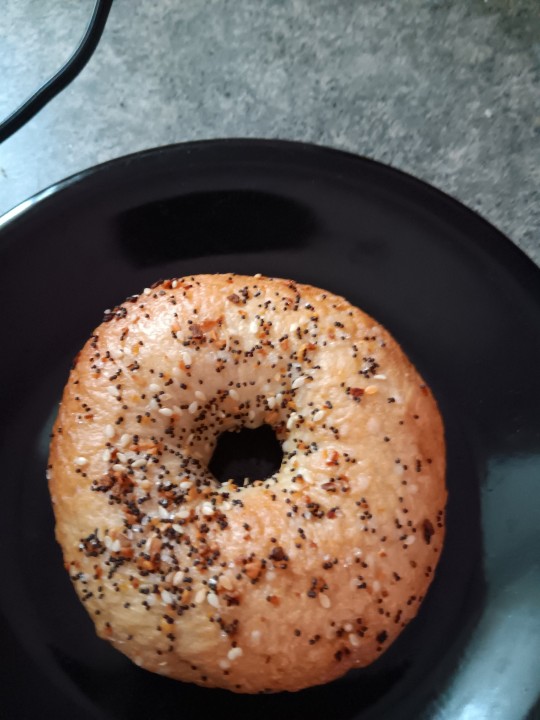
CHOOSE YOUR FLAVOR (if other than plain). This is for the dough portion ONLY: WHOLE WHEAT BAGELS: Follow basic recipe, omitting sugar. Use 3 Tbsp honey instead. In place of flour, use 2 cups whole wheat flour, 1/2 cup wheat germ, and about 2 3/4 cup all purpose flour, blended together. Knead with white flour. PUMPERNICKEL BAGELS: Follow basic recipe, omitting sugar. Use 3 Tbsp dark molasses in place of sugar. In place of flour use 2 cups rye, 2 cups whole wheat, 1 3/4 cups all purpose flour blended together. Knead with white flour. ONION BAGELS: Add 1/2 cup dried onion or 1 pkg Lipton onion soup mix to the wet mixture before adding flour. (See 'THE BAKE' if you only want some of the bagels to be onion flavor).
THE DOUGH: Using your KitchenAid with the dough hook attachement, combine the water (125F.), sugar, salt, and yeast. Add 3 cups of the flour and then the remaining flour 1/2 cup at a time until a ball forms. Knead (by hand or with the dough hook) for about 3 minutes, adding more flour a little at a time if necessary. When dough appears near desired consistency, knead in any additions for 1 minute or until incorporated. (NOTE: You can also knead till almost ready, remove the dough from your KitchenAid, and divide dough into individual (or a few each) bagels and add different ingredients to each bagel so you get a varied batch of bagels from one recipe). SUGGESTIONS: dried fruits (such as raisins, apples, cranberries), nuts, seeds, spices (such as dried minced onion or garlic), chocolate morsels or shavings, or any combination of flavorings. Knead in the ingredients until just combined, about 1 minute. Place into a lightly oiled bowl, cover with a towel and let rise (1st RISE) for 20 minutes.
THE SHAPE: Punch down dough and place on a floured work surface. Use a food scale if you want consistency, and separate dough into balls; for 8 large, 12 regular, or 16 (mini bagels). Choose a shaping method and begin: 1) THE FINGER IN THE MIDDLE METHOD: Roll each piece of dough into a ball, poke a floured finger through the center to form the hole, and then shape top and smooth sides. With the bagel on the floured counter, place your finger in the hole with the tip of your index finger touching the counter, and make small fast circles with your finger to hula-hoop the bagel around it, to widen the hole. 2) THE ROPE METHOD: Roll each piece of dough into a rope by rolling it on the bread board or between your hands. Wrap the rope around four fingers, overlap and join the ends, and turn the circle inside out. Until you get this hand movement down pat, you may have to moisten the ends to hold them together. Initially the length may be lumpy and the joint will show. It takes practice. NOTE: Keep in mind that bagels do not rise very much, so you want them to be puffy when you shape them. Don't flatten them down.
THE 2nd RISE: During the 2nd rising, the bagels will puff up slightly. Place on a baking sheet lined with parchment paper. Cover them with a plastic wrap that has been sprayed on one side with nonstick vegetable spray. Place them in a draft free location and let them rise at room temperature until puffy, about 20 minutes. NOTE: Bagels can be refrigerated at this point, should you decide to boil and bake them later, or the next morning. Leave them covered so they do not dry out. Remove from the refrigerator and allow to warm slightly while you boil water and preheat the oven.
THE BOIL: Fill a 5 quart soup pot with water 4 inches deep (you can add 2 tablespoons honey or sugar for a sweeter bagel). Drop bagels one at a time into the boiling water. Boil about 3-4 at a time or only so many that they float freely, and are not crowded. Simmer for 30 seconds (15 seconds on each side), turning with a slotted spatula. NOTE: Put the top side of the bagel down into water first, and then turn over. When you remove them, the bagels will be top side up and slide off your spatula for draining and adding toppings. Remove and place them gently on a lightly greased cooling rack (that has been placed on top of a clean dish towel) for a few minutes to drain.
THE GLAZE: Choose your glaze and brush tops before placing them in the oven: 1) WATER GLAZE: Spray bagels at the beginning of the baking (using a mist bottle makes this easy), again 5 minutes after placing them in the oven and again near the end of baking. A spray (or brushing) with room-temperature tap water will yield a subtle glaze. 2) NONSTICK COOKING SPRAY GLAZE: Spray before placing in the oven and again about 5 minutes before baking time is completed. Nonstick cooking spray goes on more evenly than using a brush and yields an even glaze. 3) EGG GLAZE: Mix together 1 egg with 1 tbs. water, milk, or cream. Brush it on the bagels before they are put into the oven. 4) CORNSTARCH GLAZE: Dissolve 2 tbs. cornstarch in 1/4 cup cold water. Bring 1 cup water to a boil and whisk the dissolved solution into the boiling water until it thickens. Brush it on the bagel tops at the beginning of the baking and again as soon as you remove the bagels from the oven for a very high shine.
THE TOPPINGS: A variety of toppings can be added to the bagel before baking, either directly to the dough after settling, or after the bagel is glazed. Use as much or as little topping as you like. To brush the toppings on, use a ratio of 2-1 dry ingredients/1 water or oil. VARIATIONS: ONION- Use dehydrated onion flakes or packaged onion soup mix. 3) SEEDED- Sprinkle boiled bagels with sesame seed, poppy seed, or caraway seed (especially good on rye bagels) after using glaze and prior to baking. Poppy, caraway, sesame and celery seeds can be used directly from the jar. Just dip the bagels into a dish of seeds or sprinkle seeds on top. 4) TOASTED NUTS: Using them on (and in) bagels enhances their flavor. Walnuts, almonds, pecans or hazelnuts can be used on bagels as toppings and also added to the dough at the beginning or before they are shaped and rise the second time. 5) OATS/GRAINS: Sprinkle with rolled oats or multigrain cereal, which will brown while baking.
THE BAKE: Preheat the oven to 400°F Choose your baking surface then continue on to the steaming. 1) BAKING SHEET: Line a baking sheet with parchment paper (as it eliminates the use of oil and cornmeal and cleaning pans). Place bagels on the shelf just below the middle in the oven. 2) BAKING STONE: Place the stone on the lowest rack in your oven while preheating the oven (with stone inside). Sprinkle cornmeal on the stone. Transfer un-baked bagels to the hot surface using a wooden peel (a long-handled wooden paddle used in baking), or any flat instrument with a long handle so you don't burn yourself; wear heavy padded gloves (NOTE: you can also place parchment paper on your peel and slide it off onto the stone with the bagels right onto the peel). NOW FOR STEAMING (Optional): Place a heavy pan in the very bottom of your oven (under the bottom rack) while it is preheating. Place the bagels in the oven and then pour cold water or half a dozen ice cubes into the pan and spray the sides of the (preheated) oven with water from a spray mist bottle when you place the bagels inside (This gives the bagel tops a crisp crust and extra shine by creating steam during the first few seconds of the baking). Bake for 20-40 minutes (depending on their size) until the tops are a light golden brown.
0 notes
Text
Sensory Issues/Things I Struggle With
This is a post listing the sensory issues I've noticed. Sometimes I don't recognise things as sensory issues that I should, until suddenly one day I go '...Oh.' So I suppose I wanted to go through the senses that I observe issues with, as much for a way to have it easily documented as anything else.
This is, of course, an incomplete list. I somewhat ran out of 'fizz' halfway through.
Aural/hearing
Loud
Deep/low tone (if it sits in your ribcage and quivers, please get me out of there)
Shrill/high tone (I enjoy sopranos, even high notes, but some can be unpleasant and violins can also have extremely unpleasant noises; even bagpipes, one of my favourite instruments ever, can be painful to listen to when I'm feeling overstimulated)
Scratchy tone (nails on a blackboard, chainsaws, things cutting through metal; all of those sorts of things)
Pitch wrongness (though I don't have perfect pitch by any means)
Ultrasonic noises (unsure that's the right terminology, but the sort that you can see rippling towards you is hell)
Lots of noises/overlapping noises (such as crowd conversation)
People talking loudly
Excessive dissonance in music (can get overwhelming if it's just too much)
Visual/seeing
Sunlight (can be too much even with sunglasses)
Harsh lights (supermarkets can be difficult because of the harsh lighting)
Too low lighting when I need to do things
Spotlights contrasting with the darkness
Tactile/touching
Acrylic yarns (can be rough and scratchy)
Things that don't feel like I expect them to feel
Wool (of any kind) on the backs of my hands (variable)
Wool on my forehead (like beanies or berets; varies; I now have bangs across my forehead, curtain bangs, and took over a year to decide to go for them for sensory reasons)
Rough/scratchy things
The buttons on a specific green cardigan I have feel awful and yet I feel compelled to rub them with my fingers whenever I wear that cardigan even though the feeling is deeply unpleasant
When overstimulated all my clothing and all the textures I'm feeling become Too Much - sometimes I have to not wear things with extra texture that usually help me because they are too much, like woollen garments
A specific type of shirt I have is good texture unless all texture is too much
Flowers with nice cool soft petals like roses are gorgeous
Stimming using specific hand motions is good largely because of the feel of my hands against one another
Olfactory/smelling
Just about any smell when smelled for very long is unpleasant
Many flowers are too sweet and make me lightheaded very quickly
Gustatory/tasting
Sultanas and raisins are a good enough taste but the texture can go die in a hole
A bunch of South Indian foods I detest solely because of texture; so sorry South India, I love some of your foods (and the ones I don't, I can't spell, lol)
I don't really have any 'won't eat' foods; I definitely have a bunch which are 'I would prefer to eat nothing than this' (though this probably plays into not-yet-diagnosed anorexia as well) but that's usually not an option, or at least it's not an option I'm aware of
1 note
·
View note
Text
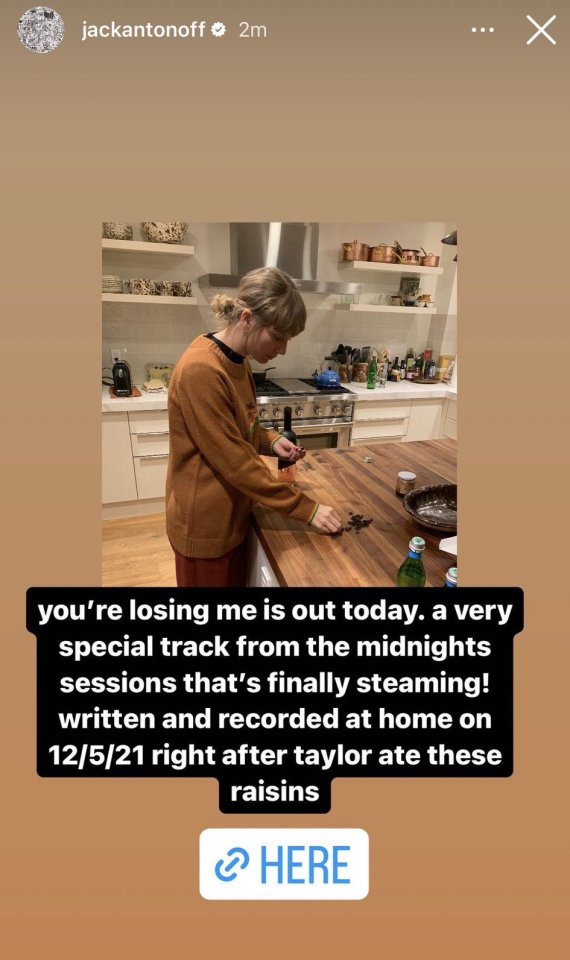
November 29, 2023: Jack Antonoff posts an Instagram story clarifying that Taylor wrote and recorded 'You're Losing Me' in early December 2021, just after eating her small snack of steaming? raisins. (source)
#year: 2023#november 2023#year: 2021#december 2021#song: you're losing me#song: ylm#overlap: raisins#steaming?#topic: hot raisins#topic: snacks#people: jack antonoff#overlap: jack antonoff#mutual friends#overlap: friends#overlap: collaborators#album: midnights#era: midnights
5 notes
·
View notes
Photo
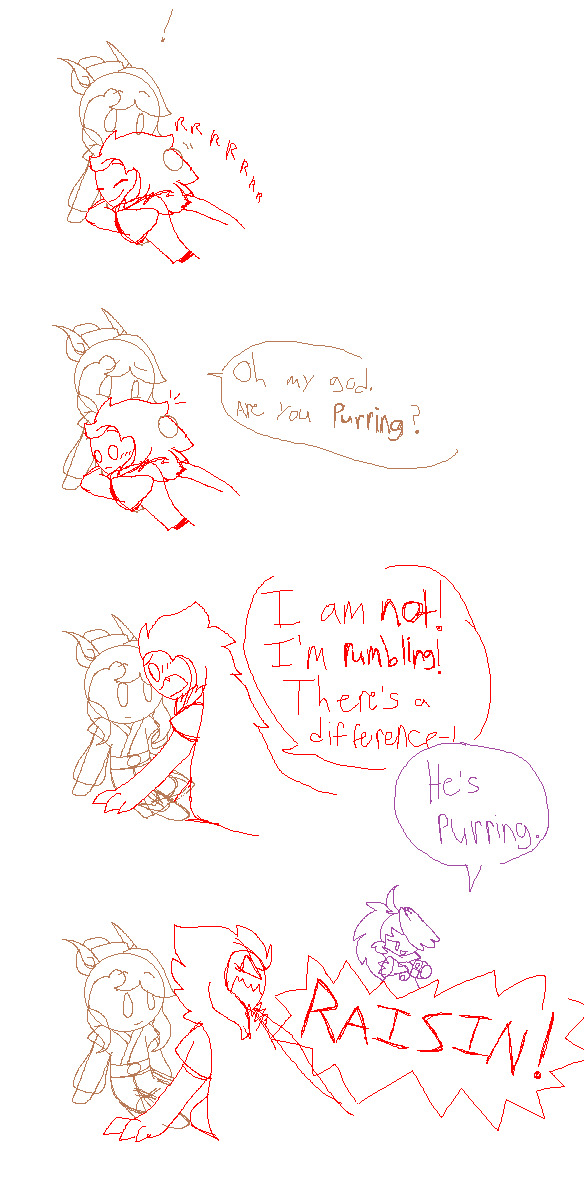
Sketch of a comic I might line and color another time
#Cookie Run Kingdom'#Caramel Arrow Cookie#Red Velvet Cookie#Black Raisin Cookie#There is actually a difference between dragon rumbles and cat purrs#but the reasons behind them do overlap a bit
6 notes
·
View notes
Text
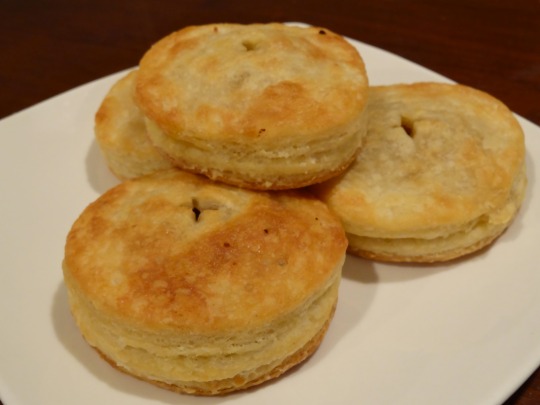
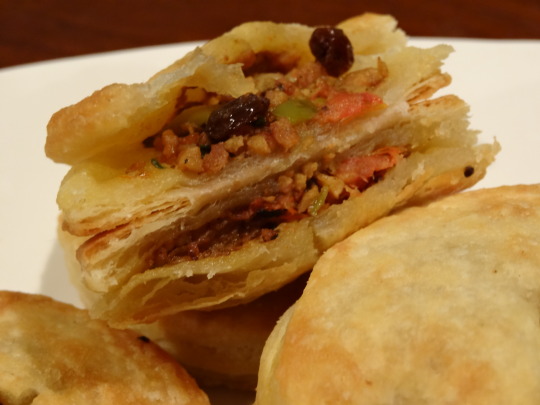
[ID: First image shows four small, circular pastries with x-shaped vents piled on a plate. Second image shows one of the pastries broken open to reveal ground beef, black raisins, and bits of olive and tomato. End ID.]
Bakery-style pastelitos de carne (Cuban stuffed pastries)
Pastelitos de carne are Cuban pastries stuffed with picadillo—a sweet-and-savory filling made from ground beef, olives, raisins, and sometimes potatoes. This recipe uses a sofrito of minced onion, bell pepper, garlic, tomato, and spices to provide an intensely flavorful base for the picadillo filling.
Homemade versions of pastelitos de carne often use rough pastry to encase their filling in large pasty- or turnover-style shapes. This recipe, on the other hand, is based off of a common style of pastelitos sold in Cuban bakeries—bite-sized bits of picadillo encased in flaky, tender puff pastry that is brushed in sugar syrup after baking to enhance the savoury-sweetness of the filling.
Recipe under the cut!
Patreon | Tip jar
INGREDIENTS:
For the dish:
1 batch of puff pastry
6 Tbsp (1/4 cup + 2 Tbsp) fine textured vegetable protein (TVP)
1/2 cup vegetarian ‘beef’ broth from concentrate, divided—or substitute vegetable broth + 2 tsp dark soy sauce
5 Tbsp extra virgin olive oil, divided
1/2 small yellow onion, minced
1/2 small green bell pepper, minced
1 small golden potato, diced (optional)
2 cloves garlic, minced
1 Tbsp pimiento green olives, diced (optional)
1 Tbsp black raisins (optional)
2 roma tomatoes, chopped and puréed (1/4 cup), or 2 Tbsp tomato sauce
1/2 Tbsp tomato paste (optional)
1/2 tsp chopped fresh oregano
1/4 teaspoon salt, or to taste
1 ciliment (bay rum) leaf
1/2 tsp cumin seeds, or ground cumin
1/2 teaspoon ground black pepper
1/4 tsp sazón
pinch ground Ceylon cinnamon (or substitute cassia)
To assemble:
1 Tbsp non-dairy margarine, melted
1/4 cup (60g) vegetarian granulated sugar
2 Tbsp water
Ceylon cinnamon, or "true" cinnamon, is often used in Latin American countries; varieties of cassia cinnamon, which is harsher in flavor, are more common in the U.S. You can find Ceylon cinnamon at a speciality spice or international foods store; it should have thin, flaky, densely overlapping bark, rather than thick swirls.
Bay rum leaves are a common ingredient in cuisine throughout the Carribbean; rather than the sharp citrus-and-pine aroma of a California bay leaf, they have notes of sweet spices and vanilla. If you don't have any, substitute a pinch of allspice, nutmeg, or clove.
The link to a sazón recipe is for a Puerto Rican version, but a typical Cuban version of the spice blend consists of the same ingredients—just reduce the amount of achiote by about half.
Raisins and/or olives are typically included in bakery-style pastellitos, but they may be omitted if you dislike them.
INSTRUCTIONS:
For the filling:
1. Cut the potato into a small dice. Soak it in a bowl of cool water to prevent browning and remove excess starch while you prepare the rest of the filling.
2. Prepare the TVP. Hydrate TVP for about 10 minutes in 1/4 cup + 2 Tbsp 'beef' stock, plus a pinch of sazón.
3. Heat 3 Tbsp olive oil in a large pan on medium-high. Add TVP and spread it out in a single layer. Allow it to brown without agitating for a few minutes before stirring it, scraping the bottom of the pan. Repeat this process a few times, adding more oil as necessary, until the TVP is deeply golden brown on all sides. Remove TVP from the pan.
4. Make the sofrito. In the same pan, heat another Tbsp of olive oil on medium-high. Add the bay leaf and cumin seeds and fry until cumin is fragrant.
5. Add the minced onion and sauté for 3-5 minutes until translucent. Add garlic and cook for 30 seconds until fragrant and no longer raw-smelling.
6. Reduce heat to medium. Add ground spices (sazón, cinnamon, and black pepper) and mix to combine; sauté for another 30 seconds.
7. Add bell peppers and allow to cook for several minutes until tender. Add tomatoes (I like to push everything else to the side and add the tomatoes to the center of the pan to allow them to come into direct contact with the cooking oil) and tomato paste and cook, stirring occasionally, until the mixture is mostly dry.
8. Finish the filling. Add browned TVP, fresh oregano, raisins, and olives. Add the remaining beef stock to deglaze the pan and continue cooking until the filling mixture is again mostly dry. Remove from heat.
9. Remove potatoes from water and pat dry. Heat 1 Tbsp olive oil in a medium skillet and fry potatoes in a single layer, agitating every few minutes, until golden brown. Mix with the rest of the filling.
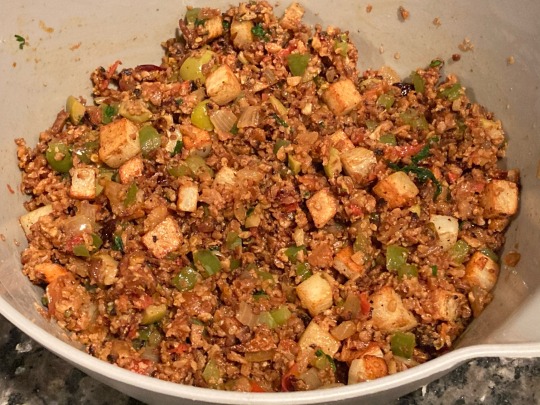
To assemble:
1. Divide puff pastry into two, leaving the half you’re not working with in the fridge. Roll out into a rectangle about 1/8” thick and cut into as many circles as you can with a 2” cookie cutter or the rim of a glass, placing each circle on a parchment-lined plate. Place the plate in the fridge and repeat with the other half of puff pastry.
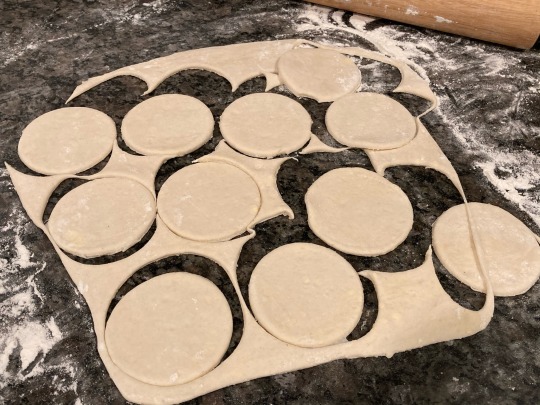
Remaining odds and ends of puff pastry may be baked as they are and eaten brushed with sugar syrup or topped with jam, spreadable cheese or fruit; they may also be gathered, rolled out again, and used as rough pastry.
2. Place a heaping spoonful of filling on top of a circle of pastry, and top it with another pastry circle. Press down firmly around the edges to seal. Repeat with the rest of the pastry circles.
3. Brush the top of each pastelito with melted margarine to aid in browning. With a sharp knife, make a small slit in the top of each pastelito to vent.
4. Return the shaped pastelitos to the fridge or freezer and preheat your oven to 400 °F (205 °C). While the oven preheats, prepare a 2:1 simple syrup by combining 1/4 cup sugar with 2 Tbsp water in a small saucepan and heating on medium, stirring often, until the sugar dissolves.
5. Bake pastelitos for 15-20 on the highest rack of the oven until deeply golden brown on the top and around the edges.
6. Using a pastry brush, brush pastelitos with simple syrup. Serve warm.
#vegan recipe#recipe#cooking#vegetarian recipe#vegetarian cooking#Cuban#TVP#puff pastry#olives#raisins#bell peppers
123 notes
·
View notes
Text
SWYAATL 17: Nature Offers Her Violence

Pairings: Eren Jaeger x fem! Reader
Warnings: canon-typical violence & gore, angst, anxiety, mentions of character death
Summary: “It’s still scary,” you say. Jean turns to you. “I killed one, but I’m still scared.” His eyes soften. “Good. Fear keeps you humble. But that doesn’t mean you’re not brave.” “That doesn’t make sense.” “Bravery isn’t the absence of fear. It’s being scared and still doing what you have to do despite it.” He looks out over the roofs—your Jeanie, who looks so much older than you remember after just a few hours— “Marco told me that.”
Notes: [01] || [16] | [18]
Words: 6.5k
A/N: Another 2 weeks gone just like that. I can't wait for vacaction to roll around and finally really commit to writing more. Dear anons who sent me an ask, I didn't forget about you!! I just need a little more time to finsih the little something for you guys hehe. Thank you as always for such overwhelming, amazing support. I don't know where this would be without you guys ♥

17: Nature Offers Her Violence
Emil’s voice is like a whisper, so close and clear in your ear as though he is standing right next to you: “There is no easier way to make an animal dangerous than by feeding it.”
Now, you have been fed the most dangerous of all things: Power.
Scratching the skin between your eyebrows with your torn, bloody nail, you try to fight off the dull throbbing in your skull by pressing your thumb into your forehead. Something is different; something has changed but when you try to grasp it, it runs like sand through your fingers. Once you find a moment of respite, you need to think through it thoroughly; to carefully clean and scratch off the layers of dust and grime and reveal the painting lying beneath it. You have an awful feeling that it will look a lot like a pink-petalled tree overlooking a steep cliff. “A cherry-blossom tree,” Emil had explained.
“But cherry blossoms are white,” you had said—you are saying right now as well, many years later as memories overlap with reality. “Not pink.”
“They might not be in here,” you repeat his answer. “But out there.”
You turn to the Wall, looming ominously in all directions. Slowly, your memories are coming back—memories you have forgotten even though you don’t know why. Had Emil known because of his great-grandfather? Or because you had shared your mother’s books with him? You wonder if that painting is still out there, under the ruins and debris of Emil’s house. It couldn’t have possibly survived all the years exposed to the weather and nature’s violence, but if … if …
The metal ring lies hot against your skin. You pull it up from under your shirt, inspecting the ruby orb, the way the light glides off it as though inside liquid is moving. Emil’s ring is more than just a childhood’s promise. It was very important to him, he had said so himself. Another riddle to solve later. This moment feels as though the axis of the earth is tilting ever so slightly, but the outcome will be fatal, and you are at the very centre of it.
You cram the ring back under your shirt, glad for the familiar presence of its weight against your skin. The Titan has begun to fall into itself, shrinking like a raisin. It won’t take long until only bones are left. When you make your way down to the ground, it is only to confirm that the rest of your team is dead. There is no use checking Franz—with only his upper body left, he has bled out, his organs strewn across the street. You don’t want to be the one to tell Hannah.
Turning away abruptly, you cross the street to Karl’s body. His head is split open—you think back to the day Jonathan died in the forest. Two years ago, everything had seemed so much simpler. When the villain of your story had been another person, and that person ended up being punished. Playing hero was easier when your own life wasn’t at stake.
You shake those memories off, turning away as bile rises in your throat and you take deep, forceful breaths to stave off the nausea. There is no time to do anything—the squad responsible for cleaning the bodies won’t have a chance to retrieve Karl and Franz anyway with the hole in the Wall and Titans roaming around. Which leaves the last person in your group—Daz. Even before you start searching for him, you already have a feeling about what has happened: He had been already gone before the fight had started, leaving the rest of you to fight the Titan by yourselves. He had abandoned you.
Only now you realise the reason your hands are shaking isn’t from the adrenaline or the lingering fear—you’re furious. You’re so angry at Daz and by proxy at your own previous hesitation. Maybe things would have turned differently if you had reacted faster. Maybe everyone from your squad wouldn’t be dead now. Your knees wobble from that realisation, and you brace yourself against the corner of a house, forcing heaps of air into your body and exhaling them in slow, shaking breaths.
The mission. Focus on the mission. Everything else can wait. If you make it through this.
Using your ODM gear, you move back to the district’s centre. Being on your own is a death sentence should you come across more Titans. As soon as you near the Main Square, you hear it. The screams, the heavy thuds when you skid across a roof and come to a halt near its edge.
Doors are open all up and down the rows of houses—people are darting out of them, then stopping dead when they see the street crowded with Titans.
It is impossible, unimaginable. That only five years after Shiganshina fell, it is happening again. And now there are dozens. Dozens upon dozens. Maybe hundreds, flooding the streets like a poisonous current. You feel as if you are trapped behind a glass wall, able to see everything but unable to move—watching, frozen, as a 3-metre Titan seizes a fleeing boy and lifts him bodily off the ground, sinking its serrated teeth into his shoulder.
The boy screams, but his screams are lost in the clamour that is tearing the day apart. The sound rises and rises in volume: the howling of Titans, people calling one other’s names, the sound of running feet and shattering glass.
Your name. Someone calls your name.
Hands curl around your shoulders and shake you. You raise your head slowly; Marco’s white face floats against the thunderous, grey clouds billowing behind him. You can’t remember Marco walking toward you, can’t remember seeing him on the roof at all; it is as if he’s materialised in front of you all at once, like a ghost.
“Marco.” Your voice comes out slow and uneven. “Marco, stop. I’m all right.”
You pull away from him.
“You don’t look all right. I’m sure nobody is all right at a time like this.” Marco glances at the street below and curses under his breath. “We have to get the Titans away from the evacuation roads. Where’s the rest of your squad?”
You blink. There are no Titans in view for now; it should scare you how fast they move into wherever they sense people. Someone is sitting on the front steps of the house opposite you and crying in a loud and grating series of shrieks. The boy’s half-torn body is still in the streets, and the smell of blood and death is everywhere.
“Dead.” Your voice is hollow, just like the pit in your stomach. “Except me and Daz. Frank and Karl—”
The person on the stairs is still sobbing. Shouldn’t the rear guard be here, evacuating people? Out of the corner of your eyes you see uniformed soldiers approach the crying person—Reiner and Bertholdt.
Marco swears. You blink against the burning curtain of tears and square your shoulders, ball up the knots of your emotions and push them so far down where they don’t hurt anymore.
Stepping out of Marco’s looming shadow, Annie regards you with a tightly locked expression—a door firmly sealed shut. “The Titans are moving towards the Inner Gate. Something must be holding up the evacuation,” she says.
“Let’s hope they have more luck holding them back than us.” Reiner’s joined you. His eyes pass over you, pausing on the dried blood on your uniform, the ripped fabric of your pants. Seconds later, Bertholdt is behind him. They must have told the person to hide, because now the street is deserted.
“This is way beyond our capabilities,” Bertholdt mumbles. He looks a little green and keeps throwing glances over his shoulder. “We should find the others. We’ll be stronger in numbers.”
“That might lure out more Titans if they sense a bigger group.” Reiner kneads the tense muscles in the back of his shoulders. “But I’m all for regrouping, so let’s be smart about this. We’ll look for the rest of the 104th. Stick together, got—”
Before he can finish, the watch tower’s bells ring a second time this day. For the first time, that sound doesn’t fill you with dread and fear. It means the evacuation is done, all citizens who managed to reach the Inner Gate are on the other side and safe.
“Finally. I thought things would never start looking up for us.” A weary smile passes Reiner, there and gone too quick. “Nice timing, too. I’m running out of gas.”
“They should distribute supplies down Regent Street. Let’s hurry. It smells like rain.”
Marco’s right. As you begin to navigate through narrow alleys, past crumbling buildings and the corpses of soldiers and civilians, the sky opens up and rain falls in unrelenting torrents. You wonder if that might be enough to wash away the blood on the streets, to clean the pavement from today’s horror.
Too scared to look down and identify one of your friends, you keep your eyes set on Marco’s broad back until he turns a sharp left, following Reiner’s lead up on a crimson-tiled roof where you spot familiar faces keeping watch. Half of the group is on the outlook, the rest huddling around a slumped figure.
Nothing seems odd until Marco mumbles, “Why isn’t anyone going over the Wall?”
You notice it then, too. How quiet everything is apart from the pattering rain. No sounds of ODM gear zipping through the sky.
Like a compass, your eyes rivet on Jean first, slumped into himself on the roof and for a second your heart beats in your throat in fear he might be injured. But when he snaps a response to whatever Connie just asked a second ago, he seems unhurt. “There’s nothing we can do! How the fuck are we supposed to scale the wall without gas?!”
“There’s gotta… there’s gotta be something.” You’ve never seen Connie in so much terror. “We can’t just … that means we’re gonna…”
“What’s wrong?” Reiner demands. It seems like nobody has even noticed your group’s arrival. “Where’s the supply group?”
You meet Jean’s eyes. A multitude of emotions changes his expression at once—relief, anger, and then it settles on utter despair. He buries his face in his hands, and mumbles, “Those fucking cowards … we’re gonna die because of them.”
“Were they wiped out? What happened?” Marco asks, hesitating. He’s drawn closer to Jean, and for a moment he reaches his hand forward to pull Jean up, only to withdraw it immediately as though realising he’s facing a cornered, scared animal that will immediately snap its teeth at him.
“I guess they’ve barricaded themselves inside HQ. Apparently, they lost the will to fight,” Jean explains, his voice hollow. “I can understand that feeling.”
You can’t keep quiet anymore. “But abandoning their duty to supply us? Just leaving us out here to … die.” You feel sick, thinking of Daz. He’s still nowhere in sight among the other cadets, and by now, you wouldn’t beat an eyelash if you found him torn from limb to limb in the gutter. “We’re all scared. Yet we keep fighting.”
Jean considers you for a long moment with a bland expression, his eyes blank. Slowly, he shrugs. “Not that it matters. Titans have swarmed the place. We can’t even get gas for ourselves.”
“So what?” Connie snaps, swinging his arms violently and you have a feeling he’s seconds away from trying to beat sense into Jean. Marco, who’s honed his skills on sensing whenever Jean’s about to get his ass kicked for his brutal honesty within those three years of Cadet Training, steps between them. “Hanging around here’s no different! The Titans will gather here too. We should use everything we got and finish them off right here.”
“Do you really think we have the manpower to pull that off?” Jean turns his head, regarding the rest of the gathered rookies. “Look at us. Most of the veteran members of the vanguard have been wiped out. We’re just cadets. Who can possibly take charge of a suicide mission like that?”
You follow his gaze, take in the sunken forms of the other recruits. Their defeat, their hopelessness. A girl sits curled into herself, trying to make herself as small as possible. Your heart shrinks to the size of a small, hard stone.
“It’s not like we can stand a chance against the Titans anyway,” you hear Jean continue. “If Titans got into HQ, that means the supply room’s probably got some that are three or four metres tall. There’s no way we could get anything done in there.”
There’s silence. Watching Connie’s shoulder drop, you can sense the fight leaving him. “So … it’s hopeless, huh?” he mumbles.
Jean heaves a heavy sigh, which is answer enough. When he looks up again, he stares right at Marco. A moment passes between them, one you feel as though nobody but them should be part of. “You know … if I’d known this would happen, I would’ve said something sooner.”
It takes a moment before Marco can find his voice. “Ah, Jean,” he says, mournfully, his voice soft—in just the same way he had said all those months ago in the boys’ barracks when you had walked in on them jostling like little kids. “Has anyone ever told you how bad your timing is?”
You feel like you should say something; to capture this moment with words even though words were not necessary. Something like “I knew it” or “Finally” or “I love you two so much, please don’t leave me behind.”
You turn away and join Reiner’s group on the ledge looking out towards HQ to give them the illusion of privacy. Curling your arms around yourself, you feel terribly cold. Nobody calls after you.
“What now, Reiner?” you ask. You need to focus on what’s next, on how to solve this problem. Occupying your mind with solving the problem to staff off the wicked whispers of doubt and neglect. There’s time for that later, if you have the luxury to deal with it. “You think we can fight the Titans?”
“We let them gather here and it can go either way,” he says. He has his arms crossed over his broad chest, standing tall as though no gust can blow him off his feet. Just the sight of him calms you a little—strong and dependable Reiner who always has got your back. The tight knot in your shoulders eases a little standing next to him. “But if we lose our will to fight, it doesn’t really matter, does it? We’ll die.”
“Is there even a way … to get out of this city,” Bertholdt wonders, gazing out at the wall. For being the tallest of you three, he manages to look the smallest right now.
“If we die,” you think out loud, “then what’s the point? What’s been the point of any of this? What are we dying for?”
Freedom, a voice responds in the back of your head—is it Emil’s? Or Eren’s?
Eren. You turn around. Didn’t you see a blonde shock of hair somewhere? If you remember right, Armin’s been in Eren’s squad. If Eren is here, he’ll have the right words, he’ll fire everyone up to fight and not give up.
“Where’s—” you begin.
“Where’s Eren?” another voice asks.
Mikasa’s rapid footsteps on the roof sound like gunshots as she steers towards your group. Not a scratch on her, she looks just as put together as this morning when you had all left the barracks laughing and without any worry. But you notice spare blades missing in her holster, meaning she had fought. Something about seeing her warms a dark, cold place in your chest. With Mikasa by your side, you guys are invincible.
“I haven’t seen him,” Reiner says. He jabs a thumb over his shoulder. “But Armin’s over there.”
Mikasa whirls around without a second look back. She crosses the roof with few strides, you follow hard on her heels, and when she calls Armin’s name, you don’t miss him flinching so hard as though he’s been struck by a physical blow.
His eyes are locked onto the roof under him, and he doesn’t look up when you reach him. He appears to be a different person altogether. His hunched shoulders are no novelty, but the way he’s slouching now is an unread page in a usually familiar book. This page appears ripped, crumpled. Barely hanging on to the rest as though it might fly away any second but what’s written on it compromises a good half of everything that makes Armin the person he is.
You grow cold. Very cold. Every second that passes and he doesn’t answer Mikasa, your heart keeps on beating rabbit-fast and you hold your breath to keep from making a sound. Until it stops, wedged into your throat with the speed of a hydraulic press. Just jammed in there, making you choke.
“Where are Thomas and … and Mina, Armin?” you ask next, though much quieter than Mikasa.
You don’t want to know the answer.
You already know the answer.
You want to tell Armin to keep his mouth shut; if he doesn’t say it, it won’t become reality.
You open your mouth.
Armin’s head snaps up, tears run down his face, leaving clear streaks across his dirty cheeks.
Mikasa freezes.
“We … the cadets of Squad 34—” Armin’s voice quivers. He swallows, wipes snot away with his sleeve. He bends his head; his hair falls forward, hiding his face. “Thomas Wagner, Nack Tierce, Milieus Zeremksi, Mina Carolina. Eren Jaeger. These five members fulfilled their … their duties and died valiantly on the field of battle. I—I alone … survived. Only I …”
The word “alone” comes out broken, as if he can taste the bitterness of loss on his tongue and struggles to speak around it. As though he is ashamed about this outcome; that it is him delivering the news when he should have been dead as well.
The whole world stops in its motion. You’re aware the whole roof is staring at Armin, processing the words, but your head is empty. Your chest constricts painfully.
Mina. You think of her small, pale face under her crown of dark hair, of her determination in a fight and her heartening enthusiasm whenever she throws herself into a new task or challenge. You’ve promised to visit her in Karanes. She’s promised she’d take you out with her family on the lake to fish.
Eren. Oh, Eren. His dreams. His conviction. Isn’t it poetic that he died while doing what he always wanted? Killing Titans? But nothing ever ends poetically. It ends and people turn it into poetry. All that blood—it was never once beautiful. It was just red. Gods notice red. It is their favourite colour, and so they choose to draw the world in red. Over and over again, this time with the name that was supposed to be your new home—
You begin to shake violently. “Oh God,” is all you manage, and a moment later, you scramble to the edge of the rooftop, bend over and empty your stomach in heaving spasms.
Marco lurches after you, holding your trembling shoulders before you topple off the building. His face has crumpled, shattered like a damn under too much pressure, but he holds you as you tremble, as you shatter, and mumbles, “I’m sorry, I’m so sorry,” his voice thick with grief; with all his heart in those words.
Behind him, you see Jean. Standing there, motionless. Eyes red-rimmed. He’s staring at Mikasa, Mikasa. You can’t imagine what she’s feeling right now—how grief must tear her apart from the inside, eating her alive. No words can mend what is broken; can bring back and fill what is lost. And perhaps it is the greater grief, after all, to be left on earth when another is gone.
“Armin,” Mikasa says. She has such a soothing voice. So calm, so collected, like an untouched, clear water’s surface. “Now isn’t the time to be emotional.”
Armin’s face goes blank with surprise, startling him momentarily out of his grief like a record skipping a beat.
Mikasa pulls him to his feet, then turns and marches towards where you and Marco still stand near the edge of the roof, clinging to each other. “Marco,” she continues. Still in his arms, you can feel him tense up. “If we eliminate the Titans swarming around HQ, we can replenish our gas supplies and get over the wall. Correct?”
“Well, yes,” he says after a moment’s hesitation. Now that you can finally get a good look at her, you feel cold all over at the blank expression on Mikasa’s face. There is no warmth in her eyes. No light. They are dead, and so must be a part of her now that Eren is gone. “But even with you, we can’t handle them all—”
“I can handle them,” she fires back, snaps. You don’t know if you’ve ever seen Mikasa snap. “I am strong. Stronger than all of you. Very strong. As such, I can annihilate the Titans here. Even if I have to do it alone. As for all of you, you’re not only unskilled, you’re also cowards . You’re a real disappointment. You can stay here and twiddle your thumbs. Twiddle your thumbs and cry and watch.”
Her outburst commands silence. Another recruit flounders. He shoots back, “You can’t do that. Even—even you can’t take them on all by yourself!”
“If I can’t, then I’ll die,” Mikasa answers, almost matter-of-factly. “It’s that simple. But—” She turns, faces the roof’s end. “If I win, I’ll live. And the only way to win is to fight.” And then, she jumps. She flies. She disappears between buildings, moving gracefully towards the beasts that haunt your every step. What do you call the animal that, finding the hunter, offers itself to be eaten? A martyr? A weakling? No, a beast gaining the rare agency to put an ending to its own fears. She leaves you cowards, and the silence that settles is like a big, gnawing chasm.
Jean is the first to break free from his paralysis. He rubs his hand over his face, with enough force to leave red imprint marks with his fingers. “You can’t seriously just pull something like that right now,” he mumbles. “Sounding like that fucking suicidal maniac … this is all your fault, Eren.”
He whirls around and draws his blades. The sudden movement startles everyone out of their shock. Raising one blade high above his head, he screams, “Hey! Since when were we taught to let our comrades fight alone?!”
Multiple heads turn his way. You feel Marco give you a last, tight squeeze before he lets go.
Jean continues screaming over to the next roof, pointing the tip of his blade at them. “Or do you guys want to end up as actual cowards?!”
From the other end of the roof, someone else—Sasha—screams, “Yeah! You think Instructor Shadis is gonna let this slide? Come on, you cowards! You weaklings! Morons!”
Something stirs among the cadets. You can’t believe it works, but they move and draw their blades and even though they still look scared shitless, they also look stubborn and spiteful. Ready to fight.
“I have to go back to my squad,” Marco says beside you. He gives your shoulder a solid pat and smiles tentatively. “I’ll see you on the other side.”
You nod and watch him move across the roof towards Reiner and the rest. When he passes Jean, they share some quiet words and briefly squeeze each other’s arms before Marco leaves.
“This is gonna be tough,” Jean says when he steps up next to you. You shudder and collect yourself, rub away the wetness from your cheeks. When Jean doesn’t defer to your loss, you know it’s only to protect you. You’ll have time to break down later. If “later” exists for you. “But you managed to kill one of them, right?” He points to your holster where a pair of blades is missing.
“Yeah —” Your voice breaks. You clear your throat. “Yeah, I got one.”
“Good.” He juts his chin forward. “I don’t trust half of these guys not to stab themselves with their blades when zipping up their boots.”
“It’s still scary,” you say. Jean turns to you. “I killed one, but I’m still scared.”
His eyes soften. “Good. Fear keeps you humble. But that doesn’t mean you’re not brave.”
“That doesn’t make sense.”
“Bravery isn’t the absence of fear. It’s being scared and still doing what you have to do despite it.” He looks out over the roofs—your Jeanie, who looks so much older than you remember after just a few hours— “Marco told me that.”
Something infinitely warm spreads in your chest. You take Jean’s hand and effortlessly win the thumb war, squeezing his thumb because you don’t give him a minute to catch up to what’s going on. “Let’s go kick some Titan ass then.”
It’s true what they say. That the best way for team building is under attack, screaming, yelling and in pain.
Out of the corner of your eyes, you notice Armin watching you with eyes so full of grief and yearning, it’s not difficult to know what’s going inside him, and you hurt all over for him and his loss.
Losing Emil all those years back, the wounds always feel fresh like a cut you keep on reopening. But losing Jean today would mean losing a limb; another part of your body. It would mean the part of your soul residing in his body shattering and you’ve already lived part of your life cleaved in half. If the rest were gone too, nothing but a hollow shell would remain.
You’ve already lost Mina and Eren today. You won’t lose anyone else.
So in that single moment, when you look at Armin, and he looks to Jean, and Jean looks to you, you realise that all three of you would lay down your life for each other. They don’t teach you that at Cadet Corps: that you will find people so important to you because of the years you’ve fought and bled together that you will kill and die for each other. Live for each other. Such is the honour and duty of a soldier.
“I’ll go after Mikasa,” Armin says. He’s dried the last tears, and now only the red, swollen skin around his eyes betrays that he has cried. “You two take care. We’ll meet up at HQ.”
“It’s Mikasa we’re talking about, she won’t need it … but still, look after her.” Jean gives Armin a hard clap on his back. “We’ll see you on the other side.”
Armin nods, then disappears down the roof.
Jean and you follow the others. It doesn’t take long until you catch up to them. They’re standing in line at the edge of a roof, looking down at Titans roaming the streets.
“Why is nobody moving?” Jean asks. “HQ’s right there.”
“How do you expect us to pass those fucking monsters?” A Cadet with deep wrinkles on his forehead and a sharp chin whirls on Jean as though he alone is at fault for the current Titan invasion. Out of instinct, you step into his path, shielding Jean, and the cadet bumps into you and startles back.
“You’ve got a functioning ODM gear, right? Then use it,” you snap back.
The cadet scowls down at you, mutters “bitch” and turns away to another group of rookies who look unsure about this whole plan. But you can’t allow yourself to hesitate now that there is at least something you can do. This plan is better than not doing anything, and the last thing you owe to the dead is at least trying to move forward.
“Not all of us will make it,” Jean says as he surveys the streets. His voice is low, as if not to let anyone else hear and spread panic. “Not today. Not tomorrow. If there even is a tomorrow.”
“Yeah, if.” You stare down at the blades in your hands and angle them left and right until they catch the sliver of sunlight peeking through grey clouds. It’s stopped raining. Maybe that’s a sign. “It’s still worth trying.”
Jean exhales audibly. He surveys the hesitating soldiers lining up on the roofs, waiting for something, and then at the Titans that have finally sensed the living nearby and look around as though scenting their fear. A myriad of emotions flash across Jean’s face. Doubt. Resolve. Back to hesitation, then fear. You can see it in his eyes, he’s concocting something, but before you can ask, he screws his eyes shut, opens his mouth and roars: “EVERYONE MOVE OUT WHILE WE STILL CAN!”
The first line of cadets jumps. Jean’s face—pale and wide-eyed—turns to you for a second, imploring you to do what you don’t know, and then he follows them and doesn’t look back. For a moment, fear that you’ve already lost him grips you tight enough to suffocate. But he is an exceptional flyer—almost as good as Mikasa. He’s excelled at every flying test.
Only until today, the dummies haven’t tried to kill you.
Rolling your head until a bone in your neck cracks and relieving some tension, you’re about to walk off the roof when you hear something like a roar in the distance. When you turn around, nothing seems out of the ordinary. There’s nothing apart from the stomping of approaching Titans. A large bird—a hawk, maybe—soars in long lazy circles over the houses, an elegant black boomerang against the silvery sky.
Do it like that, you think. The sky is the only place where you have a chance against them.
When you fall, the wire bounces you back up right before hitting the ground, sending you higher than the rooftops and opening up the sight of all hell breaking loose.
The cadets look like small flies buzzing around in search for the exit—easy pickings for the Titans to fish out of the sky. For monsters this big, some of them move awfully nimble. Only a hair’s breadth away from you, a gigantic hand arches through the sky—closing around another cadet who was following right behind you. His screams suffocate inside the giant’s palm as one squeeze is enough to crush his lungs and bones. Your stomach churns when you hear the wet crunch of snapping bones—but that’s also when you realise the danger of this altitude.
You don’t think. Smashing your fingers into the levers, you let the wires wheel out and fall. There is so much screaming around you—somewhere in there you can hear your name—but when you evade an outstretched hand and drop to the Titan’s knee-height, you find new anchor points and real the wires back in. The metal of your gas canisters scratching across the ground makes an awful noise—heat sparks behind you as the friction grates the metal surface off. You release all the leftover gas and pray momentum carries you back up into the sky and through one of the windows of the building.
With death breathing down your neck, you throw caution out and manoeuvre recklessly between the Titan’s feet, shifting left—no, right, back to left, faster and faster until you see HQ towering above you. The wires reach their end point. You take the swing at full speed, soar higher in a wide arc and curl into a ball, bracing for impact.
Glass shatters when you smash through the window, taking off your momentum. When your feet hit the ground, you stumble and try to brake the rest of the speed—and slam right into a bookshelf. Books topple off from the impact, their spiky edges punching more bruises into your skin, but you barely feel the pain. More windows break behind you, sharp shards fly like rain in a storm. You whirl around, scanning faces to see who has managed to outrun the Titans.
There’s Sasha, Reiner, Bertholdt. A few nameless faces—all with eyes spread wide from horror at the cost that they made it. They survived. When they all stand and catch their breaths, the sudden silence is deafening.
Heavy steps come up from behind you, and before you can turn, you’re nearly knocked flat as Jean wraps the entirety of his body around you.
“Dear Lord. [Name]. [Name] [Last Name].” He holds you even tighter. “Don’t you do something stupid like that ever again.”
He’s talking about that reckless evasive manoeuvre—to close to the ground, to the Titan’s feet. You can hardly imagine what it must have looked like from all the way up where he’s been. You can hardly imagine how close you’d been to be trampled to death in the first place.
So you don’t say anything, just press your face into his chest and let yourself at last be held. You put your arms around him. Everything about him is so familiar, from the lingering apple scent—the same as his mother, to the sharp angle of the collarbone that rests just under your chin. He says your name again, repeats it over and over until your hands reach up and cup his face.
“It’s fine, I’m fine. We’re fine,” you speak over Jean’s frantic prayer of your name. “Everything’s OK, Jean.” You press your foreheads together until his laboured breath slows down slightly. Behind you, you feel another set of arms wrap around the pair of you—Marco, manifesting the long-ago threatened Jean-Marco-you sandwich. You don’t mind it.
It feels safe, and good to be held so tightly, so secure after everything you’ve been through—when you close your eyes, you can almost pretend like you’re all children playing a game, reckless and young, tumbling into each other with the wild abandon of those who have never known themselves apart and have no reason to doubt that the others will always be there, holding on to them and holding them up when they can’t stand longer.
When you’ve rebuilt your reassurance that you’re fine, you let go and survey the room. Only then you realise that a lot less have managed to reach HQ than expected.
Jean suddenly sags against you, and it takes both Marco and you to hold him up. His voice is barely a whisper. “I told them to move. I gave the order. How many people died because of me?”
“A lot more would have if you had not taken the lead,” Marco replies immediately with a ferocity you’ve never heard from him. You can see his knuckles turn white where he’s holding Jean up by his elbow. “We would still be out there if it wasn’t for you, Jean.”
Jean doesn’t look as if he’s listening. His eyes flicker across the room, and then they pause, and the remaining colour drains from his skin; it’s like watching a fire flicker and go out. You follow his sight. In the far corner, below a heavy office desk, a handful of cadets are cowering and staring up at you through big, frightened eyes. The girl has blood splattered over half her face, the source a motionless body in front of them with half his head missing.
Everything clicks into picture. Why nobody had supplied you with gas. Why HQ was so awfully silent. Why nobody had come to help.
You feel Jean’s whole body twitch. Before you can catch him, he springs forward and drags one cadet out from his hiding spot by the collar. Jean’s punch lands right across his jaw, sending him back to the floor. “You abandoned us!” Jean screams, lunging forward again—or tries to, but Marco is holding him back, his arms fastened around Jean’s torso. “People are dead because of you!”
There’s more shuffling when the girl scrambles out from under the table. “The Titans overran the supply room!” she shrieks back. Tears cut a dirt path across her cheeks. She has freckles, you notice distantly. Freckles, like Mina. Suddenly the anger at being abandoned evaporates and only cold remains in its place. “There was nothing we could do, nothing!”
“It’s your job to deal with it anyway!” You’ve never seen Jean this furious. It’s justified, but pointless, you realise. It doesn’t change anything. It doesn’t bring back the dead.
“Jean—” you begin.
The wall on the left side explodes, sending boulders and debris flying. Light pours through the hole into the dark room for a moment, before it is blocked out by a huge head. The Titan grins so hard it nearly splits its face in two.
Nobody moves for a second.
Then they move all at once.
Cadets lunge for the small door at the opposite side from the hole in the wall, trampling and stumbling over knocked over books and papers. Glass crunches under their feet, the sound like bones breaking. Someone slams their elbow into your side to get you out of the way, knocking all air out of your lungs. Marco seizes your arm and pulls you out of their way before you get slammed to the ground. He’s shouting something but the overwhelming screams of those fleeing drowns whatever he’s saying. But then he turns his head, his dark eyes wide. A muscle clenches in his jaw.
Jean. He’s just standing there, frozen to the spot. Staring at the Titans. It’s like all life is draining out of him—there is no willpower to run or fight as though happiness and laughter has never existed. He’s giving up.
You move against the tide—towards him, towards the leering Titans and their hideous faces, and clasp Jean’s hand.
When the walls come tumbling down, you hold hands, just like you did all those years ago with Emil.
This time, you won’t let go, no matter what.
The Titan jerks.
Jean is holding your hand so hard you fear your bones might break.
Something moves.
For one second, the Titan’s shadow swallows you whole, and then—a fist the size of a small carriage slams into the Titan’s face, sending it flying. Light pours through the hole. In their place another Titan stands, and it roars so loudly you cover your ears. His scream fills every narrow street and bounces off the buildings like a crack opening the earth’s crust, the boom and tremor of an earthquake.
Your mind doesn’t fully comprehend what is going on. The simplest answer is the obvious: A Titan is fighting another Titan. But that is impossible. It cannot be.
It roars again, blood-churning and bone-splitting—it is magnificent, almost, for it feels as though someone took the fury of the human race and incarnated it into this desperate howl.
Anger that is cathartic.
Liberating, almost, to know that to all things housed in her silence, nature offers her violence.

A/N: "To all things housed in her silence, nature offers a violence" is a line from Hozier's "Blood Upon the Snow". I highly recommend you guys check it out!! The song fits the hidden plot of this story SO AMAZINGLY I just had to sneak it in as a homage to the Faerie King himself. I also went back and edited a few things in chapter 13 to weave the theme into the story. Idk, it's such a small, unimportant thing haha. but i really really like it and it will make more sense on the long run, I promise.
Taglist: @arisu003, @brooki, @prttyangelz, @honeylmnade, @berriesandcrem, @im-just-star-dust
Not sure if I got everyone from my taglist, so feel free to confirm/remind me/join!
#phill.swyaatl#aot x reader#aot x you#aot x y/n#eren x reader#eren x you#eren x y/n#eren jaeger x reader#eren yeager x reader#aot reader insert
53 notes
·
View notes
Text
yes, but i think this raises a question that is maybe only interesting to me, which is like.....what makes something a book? is it just how it's bound? i personally wouldn't think of a raisin in the sun or any other play when asked specifically what books i've read recently; i sort these things in entirely different mental compartments. i don't think there's anything wrong with people having this kind of overlap, but sometimes i worry that this approach to certain plays (like a raisin... which is often taught in high school english classes) can leave out a lot of what makes them work, the lived sonic/embodied experience of seeing the text on its feet, the primary way it's meant to be experienced. idk i am def overthinking this but i wonder what other people have to say
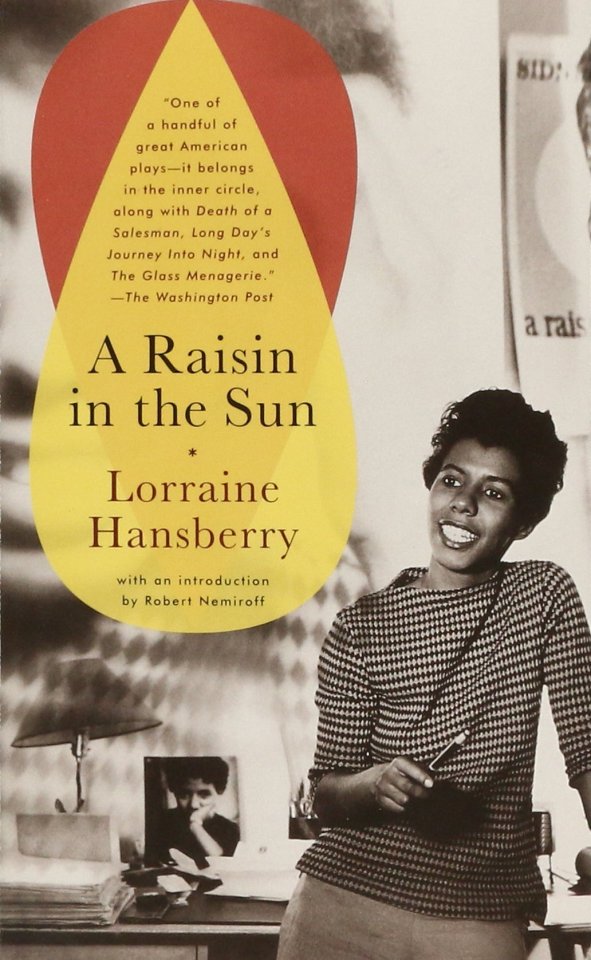
75 notes
·
View notes
Note
Why do not many people not like Gilbert? I am geniunly curious
I guess today would be a fine day to answer this...
Let me start by saying, I cannot speak for everyone in the fandom. Reasons why I like a character will differ from someone else's reasons for liking a character and vice versa.
Also, I am only going to touch upon reasons why I like Gilbert (which likely overlap with reasons common in the fandom) since you are asking me, a known Gilbert fan.
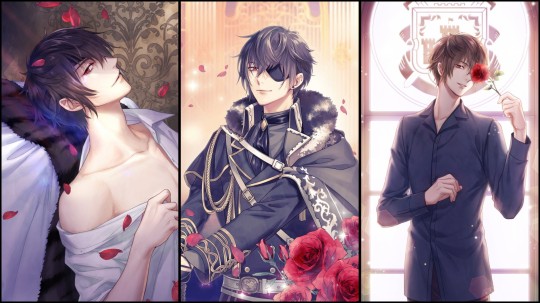
Gilbert is gorgeous. He has a dark and edgy look, his eyepatch is intriguing (what are you hiding behind there, sir?). And that cg floating around earlier today? I can go on and on.
He's a true villain. The ultimate bad boy, I am sure many have looked at him and screamed - I can fix him. Maybe you are tired of angel boys, good boys, and want someone darker. Whichever the case may be, Gilbert's route will definitely be a wild ride and one to look forward to.
He has a cute side. While I don't read Japanese, I have read translations of some of his past events. And despite some of his more sinister behaviors, Gilbert has a cute side. Maybe it's the way he tilts his head. Or the way he made raisin treats for you. Or his unbelievable appetite. But there is something endearing about this evil man.
Feel free to add to this list...
61 notes
·
View notes